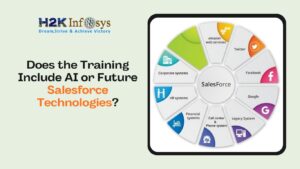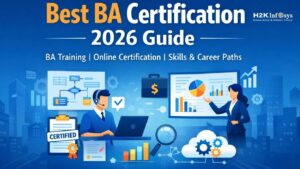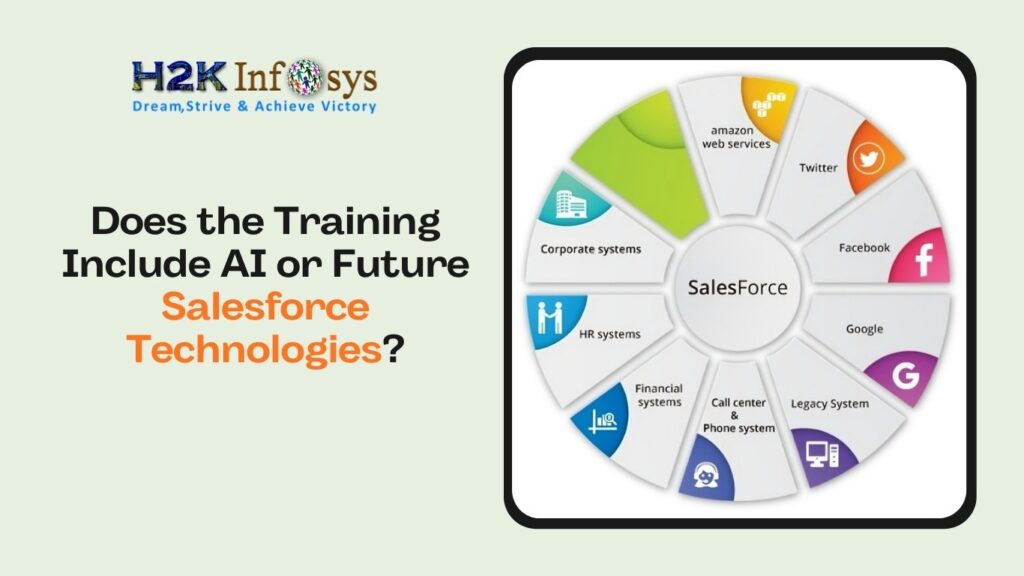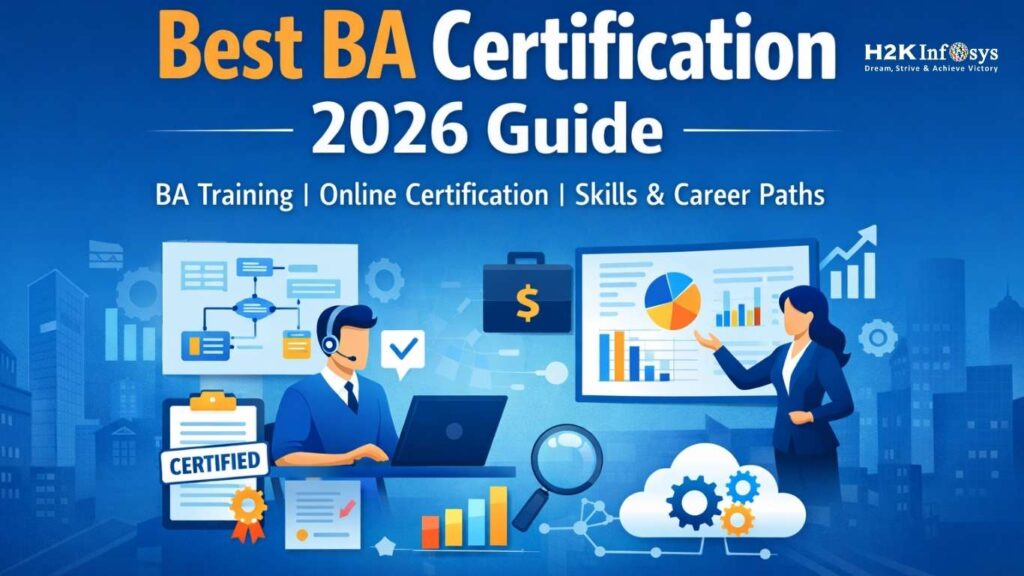Introduction: Why Salesforce Developers Are in High Demand
In today’s cloud-first world, businesses rely on CRM platforms like Salesforce to manage their sales, service, and marketing functions. Salesforce isn’t just a tool it’s an ecosystem that supports thousands of businesses and millions of users daily. At the center of this innovation are Salesforce Developers, professionals who design, build, and customize Salesforce applications to meet organizational needs.
So, where can Salesforce Developers work? The short answer: almost anywhere. From tech startups to global banks, demand for Salesforce professionals is exploding. According to IDC, Salesforce and its ecosystem will generate over 9 million jobs globally by 2026. That’s where a strong foundation through salesforce admin certification classes becomes crucial.
Let’s explore the wide world of opportunities available for Salesforce Developers, and how learners can begin their journey with Salesforce online courses and expert salesforce trainers at H2K Infosys.
Who Are Salesforce Developers?
Before diving into job markets, let’s briefly understand what Salesforce Developers do.
Salesforce Developers:
- Customize Salesforce applications using Apex (Salesforce’s proprietary Java-like language)
- Create Visualforce pages or use Lightning Components for UI
- Build integrations with external systems using APIs
- Automate business processes using Flows and Triggers
- Collaborate with Salesforce Admins to align backend solutions with business needs
A Salesforce Developer is a problem solver, coder, and innovator who can transform a company’s customer engagement strategy.
Top Industries Where Salesforce Developers Can Work
Here are the major industries hiring Salesforce Developers today:
1. Technology & SaaS Companies
Tech companies are often early adopters of CRM technologies. From product-based startups to global SaaS giants, developers are needed to customize Salesforce to fit agile workflows.
Real-World Example:
Slack, a part of Salesforce, uses Salesforce internally and employs in-house developers to manage integrations with other tools like Jira, Zoom, and Zendesk.
2. Healthcare and Life Sciences
Salesforce Health Cloud is gaining traction, making healthcare one of the fastest-growing verticals for Salesforce Developers. Developers help build HIPAA-compliant solutions to track patient data, automate appointments, and personalize treatment journeys.
3. Financial Services
Banks, insurance providers, and fintech startups rely on Salesforce Financial Services Cloud. Salesforce Developers here work on customer onboarding, fraud detection workflows, loan processing automation, and more.
Pro Tip: H2K Infosys’ Salesforce admin course includes domain-specific case studies for finance and healthcare to prepare you for industry needs.
4. Retail and E-commerce
Retailers use Salesforce Commerce Cloud to drive customer personalization, streamline order management, and create unified omnichannel experiences. Developers create APIs for payment gateways, CRM dashboards for customer behavior tracking, and marketing automation tools.
5. Education and EdTech
Universities and edtech firms use Salesforce Education Cloud for managing student records, admissions, and alumni engagement. Salesforce Developers here build portals, chatbots, and data dashboards for tracking learner journeys.
6. Government and Public Sector
Governments globally are digitizing citizen services. Salesforce Public Sector Solutions is used to streamline case management, licensing, and public communication. Developers create secure, scalable apps with strict compliance standards.
7. Manufacturing and Supply Chain
Salesforce helps manufacturers track equipment, manage supply chains, and forecast demand. Salesforce Developers can create ERP integrations and predictive dashboards that drive smarter logistics.
8. Media and Entertainment
Media companies use Salesforce Marketing Cloud to deliver personalized content. Developers help build customer segmentation models, engagement tracking systems, and integrate media consumption analytics.
Top Job Roles for Salesforce Developers
Let’s explore common job titles and how they align with your career path post Salesforce certification classes.
1. Salesforce Developer
The core role. Responsibilities include writing Apex classes, designing triggers, building Lightning Web Components (LWC), and ensuring platform scalability.
2. Salesforce Technical Consultant
In this role, Salesforce Developers also serve as client-facing consultants who translate business requirements into technical solutions.
3. Salesforce App Builder
Focused on no-code/low-code app development using tools like Flow Builder, Process Builder, and App Builder. Ideal for those transitioning from Salesforce Admin roles.
4. Integration Specialist
These professionals focus on syncing Salesforce with third-party tools using REST/SOAP APIs. Think of systems like SAP, Oracle, and Slack.
5. Salesforce Architect (Future Role)
With experience, Salesforce Developers can grow into Solution Architects or Technical Architects, leading enterprise-wide implementations.
Freelancing and Remote Work Opportunities
Salesforce is cloud-based, making remote work highly viable. Many businesses hire freelance or contract-based Salesforce Developers for short-term projects such as:
- Custom app development
- Migration from legacy CRMs
- API integrations
- Lightning component upgrades
Upwork, Toptal, and LinkedIn frequently post remote opportunities, and H2K Infosys equips students with portfolio projects to stand out on such platforms.
Freelance Benefits:
- Flexible work hours
- Global client exposure
- Ability to work on diverse industry use cases
- Potential for building your own consulting firm
What Skills Do Salesforce Developers Need?
If you’re enrolling in a salesforce admin course, expect to build the following technical and soft skills over time:
Technical Skills:
- Apex, Visualforce, SOQL
- Lightning Web Components (LWC)
- API Development (REST/SOAP)
- DevOps tools: Git, Copado, Salesforce CLI
- Unit Testing and Debugging
Soft Skills:
- Problem-solving
- Agile collaboration
- Communication with cross-functional teams
- Project management basics
Note: At H2K Infosys, salesforce online courses offer both live trainer sessions and hands-on projects to cover these skills thoroughly.
Salesforce Developer Career Paths After Certification
After completing salesforce admin certification classes, here’s how a career Trajectory can unfold:
| Career Level | Years of Experience | Common Roles |
|---|---|---|
| Entry-Level | 0-2 years | Junior Developer, Admin + Developer |
| Mid-Level | 2-5 years | Salesforce Developer, App Builder |
| Senior-Level | 5-8 years | Technical Consultant, Lead Developer |
| Expert-Level | 8+ years | Salesforce Architect, Platform Lead |
You can start small, but with the right guidance from an experienced Salesforce trainer, the sky is the limit.
Top Global Companies Hiring Salesforce Developers
Here are just a few brands consistently hiring Salesforce Developers:
- Accenture
- Deloitte
- Cognizant
- Infosys
- Amazon
- Tata Consultancy Services (TCS)
- Bank of America
- UnitedHealth Group
These companies offer full-time, remote, and contract-based roles. Many of them also sponsor Salesforce certifications for continued learning.
How H2K Infosys Helps You Become a Job-Ready Salesforce Developer
1. Salesforce Admin Certification Classes
Start with fundamentals like object relationships, workflows, permissions, and dashboards. Our curriculum is aligned with Salesforce certification objectives.
2. Salesforce Trainer with Industry Experience
All our salesforce trainers are certified professionals with years of real-world experience. You’ll learn both theory and practice.
3. Salesforce Training with Placement Support
We don’t just train we guide you to the job market. Resume reviews, mock interviews, LinkedIn optimization, and job referrals are all part of our placement assistance program.
4. Real-World Projects and Case Studies
You’ll work on actual business scenarios such as:
- Automating a lead generation process
- Integrating Salesforce with an external payment system
- Creating a custom object model for inventory management
Step-by-Step Guide to Starting Your Salesforce Developer Career
Step 1: Enroll in a trusted salesforce admin course
Step 2: Complete hands-on labs and earn your Salesforce Admin Certification
Step 3: Practice Apex, Lightning Components, and SOQL via sandbox environments
Step 4: Work on real-time projects during your training
Step 5: Apply for junior Salesforce Developer roles or internships
Step 6: Continue learning advanced Salesforce developer tracks
Step 7: Gain experience and grow into roles like Consultant or Architect
H2K Infosys simplifies this entire path with a structured learning journey supported by seasoned instructors and job placement assistance.
Future Outlook: Why Salesforce Developers Will Remain in Demand
The Salesforce ecosystem is constantly expanding with innovations like:
- AI and Einstein GPT for smart automation
- MuleSoft for seamless integrations
- Slack + Salesforce workflows for real-time collaboration
With such ongoing advancements, businesses need skilled Salesforce Developers to innovate, integrate, and implement solutions.
IDC predicts that by 2026, for every $1 Salesforce earns, the ecosystem will generate $6.19 in revenue. That’s a clear indicator of rising developer demand globally.
Key Takeaways
- Salesforce Developers can work in almost every industry from healthcare to finance to education.
- Career paths include Developer, App Builder, Consultant, and eventually Architect.
- Remote, freelance, and enterprise roles are available globally.
- H2K Infosys’ salesforce admin course offers expert-led training, projects, and placement support.
- The Salesforce ecosystem continues to grow, making it a future-proof tech career.
Conclusion
Salesforce isn’t just a tool it’s a career platform. Whether you’re just starting or transitioning into tech, becoming a Salesforce Developer opens doors to exciting industries and global job roles.
Enroll in H2K Infosys’ Salesforce Admin Certification Classes today and take the first step toward a high-growth career path with hands-on learning and real-world readiness.


























